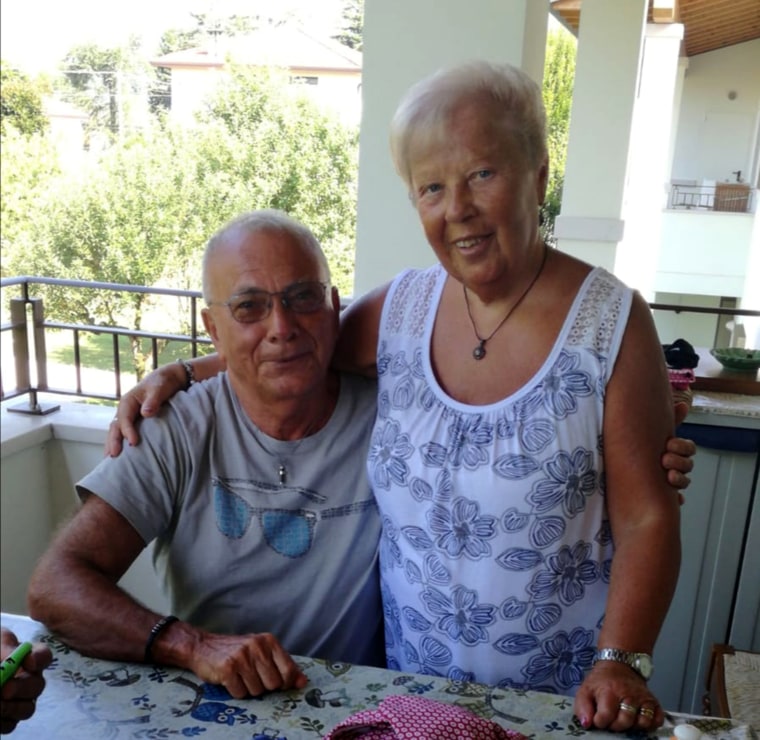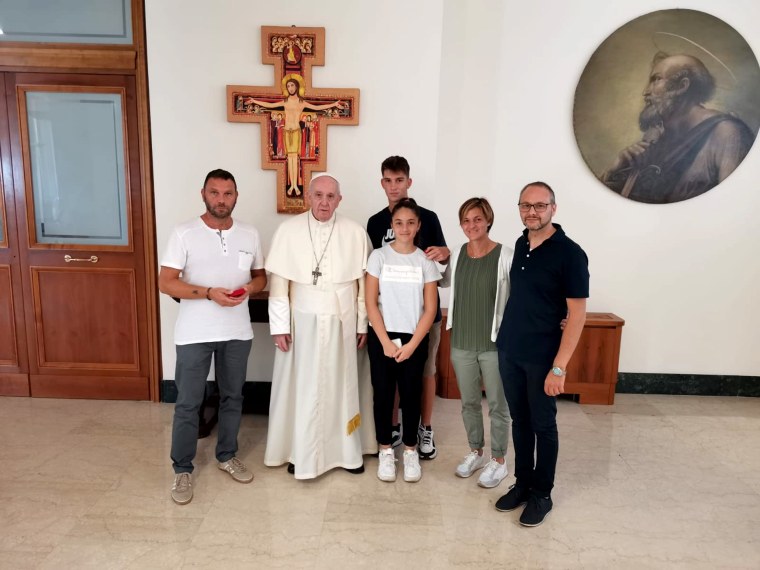ROME — When Giuseppe Chiodi, 77, came down with the flu in February, he didn't think much of it. Winter in his hometown — the northern Italian hamlet of Montello — can be harsh. Fevers, at least for the elderly, are a seasonal nuisance.
He and his wife, Giuseppina, 78, had each migrated to the north of Italy from the poorer south in the 1960s. They met in their 20s at the company for which they both worked, and they had been married for 54 years.
Both were healthy. They were looking forward to spending the rest of their retirement together.

But shortly after Chiodi came down with the flu, his wife started vomiting and found herself unable to stand.
Within days — in a story that moved the pope — Covid-19 had killed them both.
"At that time we only learned about coronavirus from the news," said Carlo Chiodi, 50, their son. "We never thought it could happen to us."
Full coverage of the coronavirus outbreak
In fact, the area had been entirely free of the virus. The first case of Covid-19 had been diagnosed in Codogno, an hour's drive from Montello, just one week earlier.
But within weeks, the virus spread like wildfire, and the area they lived in, near Bergamo, became the deadliest in Italy. So many people died of the coronavirus there that by mid-March, the cemeteries had run out of space. The dead were convoyed out of the city in a grim parade of military trucks.
Carlo Chiodi's parents weren't the only ones to fall ill during those terrifying weeks. His sister, Terry Chiodi, developed a lung infection around the same time. Her doctor told her it was just bronchitis and advised her not to visit her parents to avoid giving it to them.
'None of us was worried'
"It started as a normal flu. None of us was worried," Carlo Chiodi said. "Then we heard that a man in Montello was diagnosed with coronavirus. That's when we asked my father if he knew him."
In fact, he did: Both went to the town's senior citizens recreation club, where, yes, they played cards together.

The connection roused a suspicion that soon spiraled into a nightmare for the Chiodi family.
They started calling all of the coronavirus emergency numbers, but every time they got the same advice: If your father has no serious breathing problems, he should stay home and take paracetamol (known in the U.S. as acetaminophen).
Giuseppe Chiodi had no problems breathing. But the fever just wouldn't subside. Then, on March 10, he started coughing.
"We were teasing him, because he sounded like he was faking it," his son said. "Like we did as children when we were pretending to be sick to skip school."
But the reality was no joke. Giuseppe Chiodi's cough sounded funny to his children's ears, because his lung capacity was severely compromised. He was rushed to the hospital in an ambulance the same day.
He never returned.
"To this day I regret not having said goodbye to my father," Carlo Chiodi said. "I just watched him walk out of the house. And that was the last time I saw him."
His mother's condition also deteriorated. Four days later, she, too, was rushed to the hospital in an ambulance.
Terry Chiodi said: "I didn't expect my mother not to come back, so I just waved goodbye to her and told her to listen to the doctors. She looked at me with tears in her eyes. That's when I instinctively tried to hug her, but she stopped me from getting close to her. She knew it was probably the last time we would see each other, but she still wanted to protect me."
Three hours after his wife of more than 50 years arrived at the hospital, Giuseppe Chiodi died. She died 10 days later.
The same day, Terry Chiodi's family doctor also died of Covid-19 — one of more than 170 health workers to have fallen victim to the virus in Italy.
The coronavirus has separated families like the Chiodis in more ways than one.
Once it became clear that Carlo Chiodi's parents had contracted Covid-19, health authorities asked him to remain in their home in isolation. Then the lockdown kicked in, and he couldn't see his wife and child, who live in a nearby town, for weeks.
"I was alone in the house I grew up in, surrounded by memories of my parents and my childhood," Carlo Chiodi said. "My wife was given permission to come see me once in a while, but she would stand by the gate and me on the balcony to keep the distance."
But he was denied more than the company of his wife and child. Because he was in isolation, he was also prevented from attending his parents' funerals to say his last goodbyes. After Italy went into lockdown on March 8, all gatherings — including gatherings at funerals — were banned.
Terry Chiodi was one of very few relatives allowed in the cemetery during the burials, as she was an immediate family member who wasn't in isolation, unlike her brother. So she was there, first for her father's burial and, later, for her mother's.
"Something weird happened when my mother was being buried, days after my father," Terry Chiodi said.
"So many people died at once that the cemetery ran out of plots. So they were both placed into wall niches. But there, even there, space was limited. So they were about to put my mother in a wall away from my father's, which upset me," she said. "Then, as they were lifting her coffin, the crane stopped working. It was surreal."
As her mother's coffin hung in midair and workers struggled to fix the crane, Terry Chiodi returned to visit her father in the niche in which he had been entombed a few days earlier.
In Italy, coffins can be removed from their original niches after 30 years unless the family requests otherwise. Call it a miracle or call it coincidence, but when Terry Chiodi was at her father's niche, she saw that a space next to him had been freed up that very morning.
"I rushed to tell everyone, and so she was finally placed right next to the man she was married to for 54 years," her daughter said. "Now they can rest together in eternity."
'I was angry at God'
The story of the Chiodis — just two of the more than 35,000 victims of Covid-19 in Italy so far — caught the eye of Pope Francis, who invited the family to the Vatican at the end of August.
They were given an apartment at the Domus Sanctae Marthae, the residence inside the Vatican where the pope lives. To their surprise, the pontiff received them in private.
"We were meant to just meet and greet him, but in the end, our meeting lasted half an hour," Carlo Chiodi recalled. "He was very friendly. He even called into the room a Swiss guard to ask him to take a photo of us when we asked for it.
"But on a serious note, I did tell him that during those days I was angry at God," he said. "And he replied that being angry is OK. It is a sort of prayer for when we feel alone and powerless, like many of us were those days."
To the Chiodis' surprise, the pope talked publicly about their meeting a few hours later during the Angelus, the traditional Sunday prayer.
"This morning I heard the testimony of a family who lost their grandparents without being able to say goodbye to them," the pope said at the window of the apostolic apartment overlooking St. Peter's Square.
"So much suffering, so many people who lost their lives, victims of this disease, and so many volunteers, doctors, nurses, sisters, priests who also lost their lives. Let us remember the families who have suffered because of this."